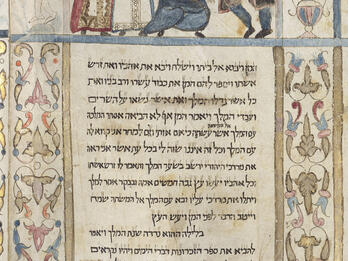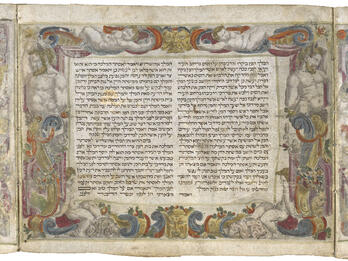Minḥat Yehudah (The Offering of Judah): Commentary on Ma‘arekhet ha-elohut (The Divine Hierarchy)
When I Judah, the son of my master, the wise and righteous R. Jacob ḥayyat, peace be upon him, was in Spain, I tasted a little honey, and my eyes were enlightened. And I took it upon myself to seek and to explore the wisdom [of kabbalah], and I went from strength to strength in order to collect all that exists from the aforementioned book [Zohar], and I collected a little here and a little there, until most of what exists of it was in my hands. And I believe with complete faith that this merit stood for me during all of the terrible hardships in which I found myself during the expulsion from Spain, that whoever hears of them, both his ears shall tingle. And to tell of all of the hardships, I knew not a few, but I will recount only some of them, and I will speak about the glory of the Lord.
My household and I traveled together with two hundred and fifty souls on one ship in the middle of winter in the year 5253 [1493] from the great city of Lisbon, which is in the kingdom of Portugal according to the decree of the king. And the Holy One smote us with pestilence, in order to fulfill His saying: I will smite them with pestilence and disinherit them (Numbers 14:12). And this was why nobody would accept us at any place: Away! Unclean! (Lamentations 4:15). They cried at us. And we wandered about on the sea for four months with the bread of adversity and the water of affliction (Isaiah 30:20). And at the end of this period, a Basque ship [lit. of Vizcaínos] came to us and returned us and our resources to the great city of Málaga, which is in Spain. And we were moored there in the bay, against our will, for we did not have permission to come onto dry land, and we were also not given permission to travel from there. And there it was decreed that no one should give us bread and water and absolutely no provisions. And this continued for five days, and on those days, the judges of the great city, along with wise men, would come aboard the ship, and they would say, “How long will you refuse to humble yourself before me?” (Exodus 10:3) and “Who is the man that desires life?” etc. (Psalms 34:13). And one day, close to one hundred people converted [lit. “left the collective”], for they could not withstand that test, and the few who remained of us of the many were aroused in our souls with the desire to die, and we said, “Good is our death at the hands of God!” Then my pleasant and pure wife, peace be upon her, died of hunger and of thirst, along with close to fifty other people—young women and young men, old people, and adolescents. [ . . . ]
And we stayed docked there in the sea for two more months against our will, until we were given permission to go to the place of our desire. And from there we traveled onto Barberia of the Muslim Kingdom of Fez—and the locusts ate that which was left untouched by the hail—and there too, I was neither calm nor quiet. And a certain Muslim who was a resident of my place in Spain happened upon the location [of Fez], for they too were made to undergo exile. He brought accusations against me, and three witnesses believed him, and they struck me, they wounded me, they took away my veil from me (Song of Songs 5:7). They threw me into a pit of snakes and scorpions and immediately decreed my expulsion, and they promised me that if I were to change my religion, they would appoint me as a leader over them and would give me a dowry and gifts, but Judah still rules with God, and is faithful with holy ones (Hosea 12:1).
God, in whom I placed my confidence, spoiled their devious plotting, while I remained there for close to forty days in darkness and despair, with scant bread and rationed water. And my belly cleaved to the earth in hunger, thirst, nakedness, and in a lack of everything. And God, may He be blessed, awakened the spirit of those who are Jewish in their roots, and they came there to redeem me, and I gave them close to two hundred books that I had in my possession for ransom.
After I left there, I went to the great city of Fez; and there was famine in the city, to the point that we would eat the grass of the field. Every day I milled with my two arms at the house of Muslims, in exchange for small slices of bread, which were so thin that they were not even fit for dogs. During the nights my belly cleaved to the earth and my stomach shrunk. Due to the great cold of autumn, and because we did not have proper clothing for the cold and also did not have houses in which to take shelter, we would dig into the garbage dumps of the city and would enter our bodies into them; at that point the verse: those who have faith in scarlet embrace garbage dumps (Lamentations 4:5) actually took place.
Afterwards I was fortunate to come to the kingdom of Naples, after several misfortunate turns of events too great to count. And there, too, I was neither calm nor quiet. The wrath of the King of France came [to those parts], and there too, in captivity they struck me, they wounded me, they took away my veil from me, along with all that I had.
Afterwards I came to the great and exalted city of Venice by way of the sea, dressed in sackcloth. And when the Sephardic nobles who were there saw me, their eyes flowed with tears and they dressed me. May the Lord reward their deed, may He keep them from experiencing bad times! If my strength is the strength of stones, and if my flesh is of brass (Job 6:12), to be able to endure all of these hardships, then indeed it is thanks to the fact that I endeavored to follow after this wisdom [i.e., kabbalah]; it is this that stood for me and upheld me, as I upheld it when nobody else would hold its hand.
Credits
Published in: The Posen Library of Jewish Culture and Civilization, vol. 5.




